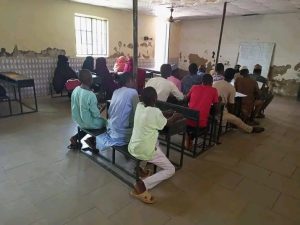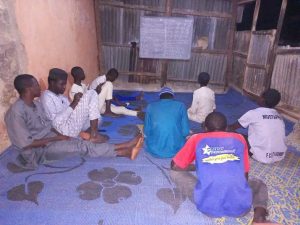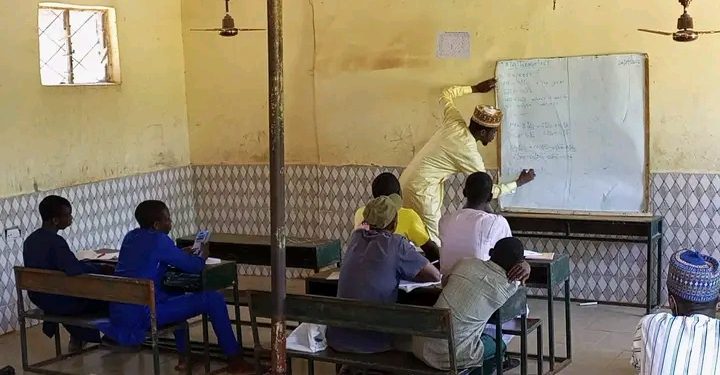By Muhammad Auwal Ibrahim
According to data from the United Nations Children’s Fund (UNICEF), Nigeria has the highest rate of out-of-school children with at least 10.5 million children, the highest rate in the world.
“A full one-third of Nigerian children are not in school, and one in five out-of-school children in the world is Nigerian,” says the UN’s children fund.
Rahama Farah, the Head of the UNICEF office in Kano told journalists in May 2022 that the estimated 10.5 million out-of-school children was relevant as of 2021. Currently, she said Nigeria accounts for about 18.5 million out-of-school children with girls, making up 60 percent of the figure.
The latest global data from the United Nations Educational, Scientific and Cultural Organization (UNESCO) shows that Nigeria has 20 million out-of-school children.
Coming down to Gombe, the state governor, Muhammadu Inuwa Yahaya has confirmed that there are more than 700, 000 out-of-school children in Gombe state, based on Better Education and Service Delivery for All (BESDA) enumeration.
Mustapha Muazu Usman was one of such children, who did not have access to basic education in Gombe.
When Muazu was taken for almajiranci – a trip in search of Islamic knowledge, he could not believe that he could combine the two systems of education together with learning basic literacy and numeracy.
Muazu, 23, hails from Kuri, a village in Yamaltu Deba Local Government Area of Gombe state. He dreams of going to school and acquiring knowledge like every other child in Nigeria but did not know how to start.
His situation is similar to that of many kids in Nigeria; the absence of educational facilities and funds to sponsor their education has marred their dreams as leaders of tomorrow.
Fighting illiteracy: the informal way
As the education crisis keeps growing higher by the day, numerous reasons ranging from poverty to insecurity, and conflicts keep fueling the situation. This development has led to public outcry on what tomorrow holds for future leaders. As such, numerous efforts are made to combat the menace, but they are not enough.
Uncle Muhsin Education Support Initiative is one of such interventions that is driving illiteracy away from Nigeria. It was founded by Muhsin Jibo, 12 years ago, in Gombe state, when the founder was in secondary school, with a view to helping his fellow and junior students through tutorials.
Jibo, the founder of the Initiative, grew up seeing children roaming around the street, not because they did not want to attend school, but because of poverty. This challenge made him spare his time and teach children of the less privileged, orphans and Almajiris.
Speaking to BONews, the founder said he started the initiative when he realised he could help with the little he had since the children were neglected.
Jibo who started by teaching two children in a mosque has since taught over 200 students. He shared that it has not been a smooth journey as education is not valued in his community.
“I come from a place where education is considered to be worthless. There are numerous children walking around who are not in school. Some began, but stopped after a while, and their parents have no interest in making them go to school,” Jibo shared.
Through his support, Jibo has helped to reduce the number of out-of-school children in his community by using his personal resources.
“I significantly lowered the overall number of children in our neighborhood who did not attend school. I have been doing this with my money and energy for years,” he recounted.
To make the class open for all, the organiser said he fixed his classes both in the evenings for weekdays and in the mornings for weekends.
According to the founder of the initiative, the aim of the classes is to ensure education for all children; “building a strong and comprehensive education, providing inclusive and equitable quality education, and encouraging opportunities for lifelong learning for everyone through community service.”
To test their (students) capability and comprehension of what they are learning, the initiative runs periodic tests based on their syllabus, asks impromptu questions, and requests for the result sheet of those who attend school among them.
“Currently, I have 65 students in my physical class. 30 are out of school while 35 are going to school. On Whatsapp, I’ve got more than 200 students. Out of the 200+, there are out-of-school children, but I don’t know their total number.
The initiative kicked off by teaching only four subjects namely: Mathematics, English, Physics, and Chemistry for secondary school students. While for primary pupils, the initiative started with four subjects as well – Mathematics, English, Verbal and Quantitative Reasoning.
“The class is completely free. I am not requesting any kobo from students. I am conducting the class using my resources, but I occasionally used to receive financial assistance from my boss, Ahmed Shuaibu Gara Gombe, friends, and several students who had been previously taught in the class,” said the initiator.
This initiative adopts a system, that categorises its class into two groups. “I have two classes: one for children who have never been in a class and another for children who are currently enrolled in school. Because if you truly want to assist them, you cannot group them together in a single class because of their different learning needs,” he added.
Children responding to studies
Muazu falls into the first category of people admitted by this initiative. When he came across the initiative, he requested they teach him how to read and write, first in Hausa language. Later on, when he developed his Hausa writing, he transited to learning English. This involves spending money in buying texts.
“I have learned a lot, because at the time I started, five years ago, I could neither read nor write. But now I can read and write.” says Muazu, who expressed delight, saying he hailed from a village, where education has less value.
Muazu is a regular attendant of Monday, Thursday and Saturday night classes and he hopes to be a scientist. With the help of this initiative, he is smiling again as he has been enrolled in a secondary school after learning the basics of numeracy and literacy under this initiative.
He, however, lamented that despite the fact that he loves to learn, he had to miss lessons most times in order to work and get what he will eat.
“Yes, sometimes I have to skip class to go and get what I will eat. I don’t have parents here. I was sent by my parents from Kuri to acquire an Islamic education here (Gombe). I wash people’s clothes to earn money, but now I have a small table selling some chocolate bars.
“Uncle Muhsin is a very nice teacher, he taught us for free and sometimes he helps us with our registration, buy some exercise books for us and even uniforms for those who can’t afford it.
I went back to school because of him. I wasn’t enrolled in school when I was sent to Gombe to acquire an Islamic education. But he encouraged me to go back to school.”

School children not left out
“Not only out-of-school children are benefitting from this initiative, but students, who go to school also attend classes to ask questions on what they didn’t understand in school or to prepare ahead of their syllabus,” said Jibo.
“Typically, I discover that elementary students can’t read or write adequately. In order to encourage children to be able to read and write, I came up with a lot of suggestions. I can even see on their school assessment how much this has benefitted them,” he said.
He added that “The majority of what is taught in class has already been covered by my students, making it easier for them to continue with their studies. They would occasionally say, when they came to see me during the semester break, that all I had taught them had made things easier for them to understand than they had anticipated.”
One of such attendant is Sa’adatu Aliyu who started attending the class in 2021. According to her, what she learnt prepared her for her university days.
“I gained a lot of knowledge; in fact, Uncle Muhsin now impacts many of the lessons we were expected to learn in school. The lessons I have learnt cannot thus ever be quantified or expressed.
“I found it quite helpful because I could even get ready for the 100-level. compared to when I started taking Uncle Muhsin’s lesson, I felt more self-assured,” she told BONews.

Leveraging the internet to reach more children
Another student is Zakariyya Dahiru, 21, a resident of Bojude, Kwami local government of Gombe state. He traveled for about 44km every weekend – Saturday and Sunday to attend classes.
“For each week, I was spending about N1,600 as transport from my pocket.” he related.
But to help people like Dahiru cut expenses and accommodate more children, this initiative hosts online Mathematics classes on WhatsApp every Friday and Sunday.
“I use plain sheets for a clear explanation, audio messages and sometimes with a video to illustrate to online students,” the founder said, showing how he teaches virtual audiences.
Dahiru started attending the class in 2021, but he is already feeling the difference.
“I have learnt the following from this initiative; in Mathematics, number bases, fraction, significant figures, approximation, ratio and percentage, root, reciprocal and surd among others; while in Physics, measurements and units, motion, and others.”
“I understand the lesson very well. It is joyful, because before Mathematics and Physics were my difficult subjects, but with this class, I found it easier and enjoyable. I am feeling much joy especially when my uncle arrives and I am in the class.”
“My hope is to become a computer scientist. I have chosen to study computer science because I am fascinated by how the computer works. I wish to spend most of my leisure time designing programs and web pages. I enjoy problem-solving and logical thinking.”
Setbacks
Running and managing such an initiative that teaches numerous children comes with a great responsibility that poses a challenge.
According to Jibo, a major hiccup is how nearby children failed to embrace the initiator’s kind gesture of educating the less privileged.
Although the founder has access to funds and support from his boss and his personal savings to run this initiative, it is not enough. He said he needed more financial aid to enable him to expand his reach.
“Due to lack of public assistance, I frequently have to stop classes until I have the funds to purchase the necessary whiteboard markers. I also used my meager wages usually to buy the necessary texts. In light of this, my plans for the classes are severely limited.” he decried.
As a university student, whenever he is resuming school, he suspends his physical classes. This shows that he only leverages the industrial action by the Academic Staff Union of Universities (ASUU) and holidays to teach these children. This has affected the children’s consistency in learning.
Expert lauds the initiative, says it should leverage on volunteers
Mufida Bashir Isyaku, a Gusau-based child advocate, explained the need for the initiative to get more hands in carrying out its activities.
“My suggestion is that they should be ready to continue what they have started, leverage on volunteers to assist them because they cannot do it alone; search for grants from donors, generate revenue because without funds projects are just ideas, monitor progress and keep track of every record no matter how minimal.
“I strongly believe initiatives like this are of paramount importance. We needed them yesterday, but many were not available. Now that we have them, we must manage them to the best of our abilities in order to scale them through because they assist by 50 percent or more in the fight against reducing out-school children in Nigeria,” Isyaku said.
She noted, as well, the importance of capacity building and research while implementing a project.
“Project management requires going through intensive training, resilience, perseverance, dedication as well as knowledge of contemporary technological tools among other things,” she said.
This story has been made possible by Nigeria Health Watch with support from the Solutions Journalism Network, a nonprofit organization dedicated to rigorous and compelling reporting about responses to social problems.

